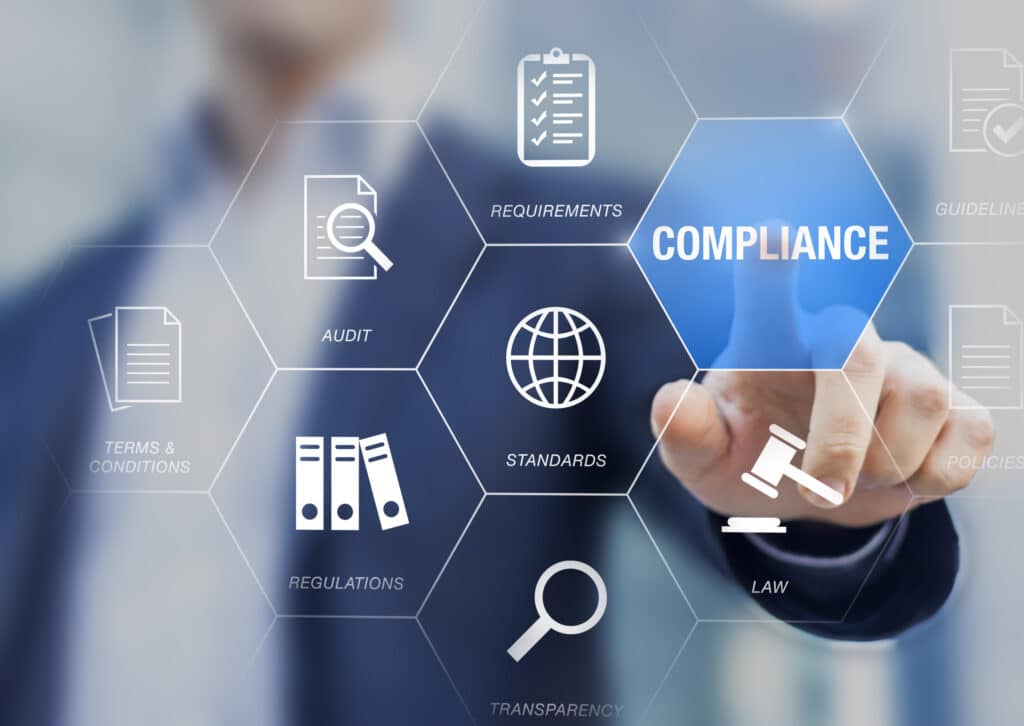Rules of Professional Conduct For Lawyers

Compared to many professions, lawyers play a unique role in serving the public interest and maintaining the integrity of the legal system at large. As a result, lawyers in the United States are held to an extremely high ethical standard and are required to follow strict rules of professional conduct.
Though lawyer ethics rules vary somewhat from state to state, they all share principles laid out in the ABA’s “Model Rules of Professional Conduct.” These rules are more than vague ethical guidelines; they affect law firms’ daily operations and can have serious consequences if not followed.
Adhering to these rules is vital to running a successful legal practice and to avoiding malpractice risk. Here, we’ll review the rules of professional conduct for attorneys, the key rules that most commonly cause problems, and the ways that modern legal software and technology can help maintain ethical standards in the legal profession.
ABA Model Rules of Professional Conduct: The Basics
The Model Rules of Professional Conduct were created by the American Bar Association, and lay out the general ethical and professional rules for lawyers practicing in the United States. Instead of acting in their own right, the Model Rules are used as a guide for state bar associations to develop their own rules.Over the last century, there have been several attempts by the American Bar Association to codify a single set of ethical standards for lawyers throughout the country. The first dates back to the start of the 19th century as the “Canons of Professional Ethics”. These rules were updated in the late 1960’s, then again in the 1980’s to their current form. Despite continuous updates, the basic tenants of the Model Rules have remained the same.
All 50 states have adopted The Model Rules in some form, with small adjustments made for state-specific requirements. However, all of the rules share certain core concepts, including:
- Confidentiality and security of sensitive client information
- Working competently and to a high professional standard
- Honesty and truthfulness in communication
- Maintaining professionalism and avoiding conflicts of interest
- Regular client communication
- Serving the public interest
The various ethical and professional standards are also laid out in the Preamble & Scope section of the Model Rules of Professional Conduct.
Why is Following the Rules of Professional Conduct Important?
Knowing the legal ethics rules is a major part of gaining admission to the state bar for most lawyers and they also have a major impact on the day-to-day operations of a law firm. Failure to adhere to the lawyer code of conduct can have serious consequences, including fines, suspension, and disbarment. Violating the rules of professional conduct for lawyers is also the basis for most malpractice claims.
But even minor infractions of the state bar’s professional conduct rules can have major consequences for a law firm’s reputation. In today’s digital world where it’s easier than ever for potential clients to research different legal professionals, that risk is even more pronounced.
What are the 5 Key Rules of Lawyer Professional Conduct?
While sometimes malpractice claims are brought because a lawyer is wilfully breaking the rules or acting criminally, many ethical slip ups are unintentional. Administrative errors, not following legal best practices, or even outdated technology can ultimately snowball into much more serious problems if left unchecked. Unfortunately, these problems are more common than you might think. In fact, it’s estimated that as many as four in five attorneys will face a malpractice claim at some point during their career. Beyond simply avoiding malpractice, a thorough understanding of the key rules and how they affect your day-to-day operations is crucial to adopting operational best practices in your law firm.
1. Legal Accuracy and Competency
Rule 1.1 of the ABA’s Model Rules concerns the client-lawyer relationship and professional competency. A lawyer is expected to represent their client with the appropriate “legal knowledge, skill, thoroughness, and preparation” that is expected of the profession. Put another way, a client is entitled to a lawyer who meets a minimum standard of ability to do their job effectively and in a timely manner.
This means lawyers must stay up to date on relevant laws and legal procedures as they change. In addition to knowing the law, they also must do an adequate amount of preparation for every case. This level of professionalism and preparation extends to the daily operations of the firm, with law firms being responsible for adopting the best practices and technologies that help them do their jobs most effectively.
An unethical example – Straying Outside of Your Comfort Zone
Say a well-meaning lawyer has an initial meeting with a client, who is looking to pursue a case in an area of law that is normally outside of the lawyer’s perview. The lawyer takes the case, assuming they can make up for any gaps in knowledge as they go along.
This runs into a potential ethical landmine, since the lawyer is going into the case unprepared. And even if they are able to do the necessary research to adequately represent their client, it still prevents them from doing the work in a timely manner.
While it’s tempting, especially as a new practitioner, to take any and all work that comes your way – the lawyer code of conduct makes it clear that you cannot accept work you are not prepared to take. Learning when to say no during the client interview, or building a professional referral network, can feel like a loss but can keep you out of trouble in the long run.
2. Communication
Effective client communication and management is a cornerstone of building exceptional client experiences and maintaining your firm’s reputation — it’s also a key ethical concern. In rule 1.4 of The Model Rules, the ABA states that lawyers are required to:
- Promptly inform the client any time their consent is needed or a decision has to be made in their case.
- Keep the client informed of updates to the case, as well as the strategy you intend to use to achieve their goals
- Immediately tell the client about any conflicts of interest or if any of their requests might break the law or the attorney rules of professional conduct.
Importantly, the ABA notes that attorney-client communication should “fulfill reasonable client expectations for information”. Those expectations have rapidly changed in today’s digital world. And while state ethics rules don’t lay out the exact timing for communication, most clients expect responses to questions and other communication within 24 hours.
Law firms that communicate with clients in person or over the phone may run into ethical issues if they’re not careful. Not only is it harder to find time to schedule these meetings but a reliance on verbal communication means that the information being relayed and the clients responses aren’t being recorded. Even when clients are emailing, it’s easy for important communications to get lost in an inbox.
In other words, relying on handwritten reminders and other manual processes to handle client communication not only minimizes the client experience but can increase a firm’s malpractice risk. As a result, adopting modern client relationship management and communications tools has been increasingly high on the priority list for a number of law firms, big and small.
An ethical solution – Online Client Communication Portal
To bring a law firm’s communications up to a better ethical standard, they might consider using a modern client portal software, like MyCase. By having all client communications and documents securely in one place, the firm is both able to respond faster and also never has to worry about losing track of important information. To avoid the ethical pitfalls of verbal communication (though sometimes talking directly with clients is great), law firms can use case management software to set reminders after client meetings or phone calls to send a follow up electronic message that:
-
- Summarizes the conversation
- Confirms any instructions or to-do items
- Sets expectations for future milestones
Overall, a client portal or similar communication system helps firms better fulfill their ethical obligations to clients while also significantly improving the client experience.
3. Scheduling and Diligence
Rule 1.3 of the Model Rules states: “a lawyer shall act with reasonable diligence in promptness in representing a client.” In other words, a lawyer must, to the best of their ability, follow up on communication, schedule hearings, prepare paperwork, and other tasks related to a client’s case in a timely manner.
The ABA explicitly notes that, “Perhaps no professional shortcoming is more widely resented than procrastination.” But falling behind on case work can quickly cross the line from bad business practice to ethical rule violation.
Examples of unethical scheduling:
-
- Overlooking a statute of limitations
- Missing a filing deadline for an important court document
- Failing to promptly follow up on client communication
- Delaying (deliberately or inadvertently) the scheduling of meetings, hearings, or discovery
In many cases, these types of mistakes are not malicious, but simply the result of relying on spreadsheets, paper calendars, or other manual processes. Additionally, with many lawyers trying their best to maximize the number of billable hours in each day, other recurring (but crucial) tasks like sending invoices or tracking time can also end up on the back burner. Regardless of the specific reason why, missing a deadline can be considered legal negligence.
Implementing a legal calendaring system can help by centralizing all appointments, meetings, and events into a single calendar. By integrating information from multiple systems, legal case management solutions can ensure that important items don’t slip through the cracks.
Additionally, software that is specifically designed for legal professionals can automate common administrative and accounting processes. Reducing the overall admin workload is more convenient, cost effective, and also ensures lawyers have more time to dedicate to their clients.
4. Fees
Coming up with an effective law firm pricing strategy is already a challenging task – but it also has ethical implications. Rule 1.5 of the ABA’s Model Rules lays out a few general guidelines for creating ethical pricing and legal billing processes, including:
- Setting a “reasonable” fee based on a variety of factors
- Always clearly communicating the price of legal services to clients
- When fees contingent on a particular outcome are appropriate
- Fee division between lawyers in different firms
A major element of ethical legal pricing is making sure clients know exactly how and what is being billed for. Using the time tracking capabilities of case management software along with legal billing software is imperative to ensuring invoices are accurate and consistent.
Unethical billing example # 1 – Vague Time Tracking
A lawyer doesn’t have to be drastically overcharging or massaging their billable hours to run into ethical issues. When time tracking is done manually, sometimes line items on an invoice are unclear. Vague statements like “document review – 1.5 hours” can cause clients to raise an eyebrow, especially if the lawyer isn’t able to pull up exactly what work was being done in that time.
While unclear billing isn’t automatically a serious ethics violation, clearly communicating your value to clients is essential to building a great reputation.
There’s also a purely technological element of ethical billing as well. Increasingly, credit cards and other forms of online payment are people’s preferred way to pay for everything, including legal services. Unlike other types of businesses, legal professionals must use billing and payment software that can:
- Avoid commingling funds in client trust and operating accounts
- Ensure that credit card processing fees are not passed to clients
- Can sort financial data for use in three way reconciliation
Unethical billing example # 2 – Credit Card Fees and Chargebacks
In most states, law firms that accept credit card payments are not allowed to pass on payment fees to clients. Additionally, in the rare case where a credit card company tries to process a chargeback, it can be a rule violation if funds are drawn from a pooled client trust account.
Using legal billing software can significantly reduce your risk of these types of ethics violations. Since the software is specifically designed to handle legal payments, it will automatically put client funds into the correct account, prepare and process invoices, as well as ensure any credit card fees or chargebacks come out of the operating account.
5. Privacy and Confidentiality
Keeping client information secure and confidential is one of the most important rules a lawyer must follow. In addition to not knowingly disclosing sensitive information, a lawyer must also “make reasonable efforts” to prevent unauthorized access to it, according to rule 1.6 of the Model Rules.
As more law firms take their businesses digital, data privacy is a growing concern. When a firm sends physical documents and invoices or keeps important information in email, it creates a significant privacy risk. Even if no data is actually stolen, a lack of appropriate safeguards might be enough to violate a state ethics board’s privacy standards.
Many law firms leverage legal billing and case management solutions, such as LawPay and MyCase, to increase their data security and reduce compliance risk. Using software specifically designed for the legal world ensures that any client communication, documents, or invoices are secured and up to state-specific security standards.
While a law firm still has an obligation to uphold security standards and PCI compliance, working with the right software partner can significantly reduce your security and compliance burden. When utilizing a dedicated legal software solution, you can rest easy knowing that your tools are up to date with data-protection best practices, payment standards, and more.
How Using Legal Software Can Help Maintain Higher Professional Conduct Standards
As we’ve hinted at above, updating your law firm’s best practices to include legal case management and billing solutions can significantly help you stay in line with your state’s rules of professional conduct for lawyers. In addition to providing a second layer of ethical compliance protection, solutions like MyCase are integral to boosting your firm’s long-term productivity and growth in the digital age.
A comprehensive case management solution can help your firm efficiently and securely implement state-compliant processes for:
- Document Management
- Billing and Invoicing
- Client Intake
- Calendaring and Reminders
- Time and Expense Tracking
- Client Communication
Ready to Learn More?
MyCase’s comprehensive case management solution is trusted by over 15,000 law firms across the United States to boost productivity, streamline client billing, and simplify communication. With features built specifically for legal professionals in mind, MyCase is built to help law firms thrive while complying with even the strictest lawyer ethics rules.
Sign up for a 10-day free trial or schedule a MyCase demo today to learn more.






